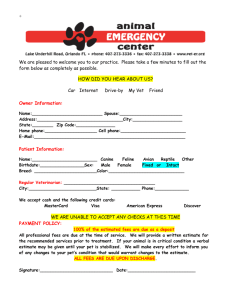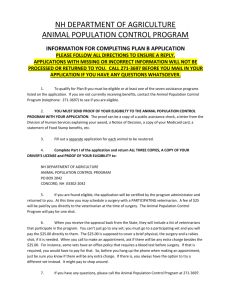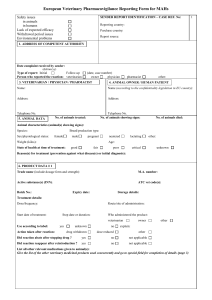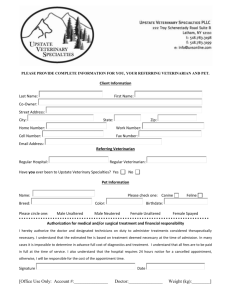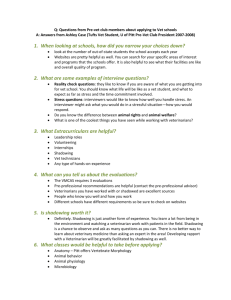Safe work method statement - NSW Department of Primary Industries
advertisement
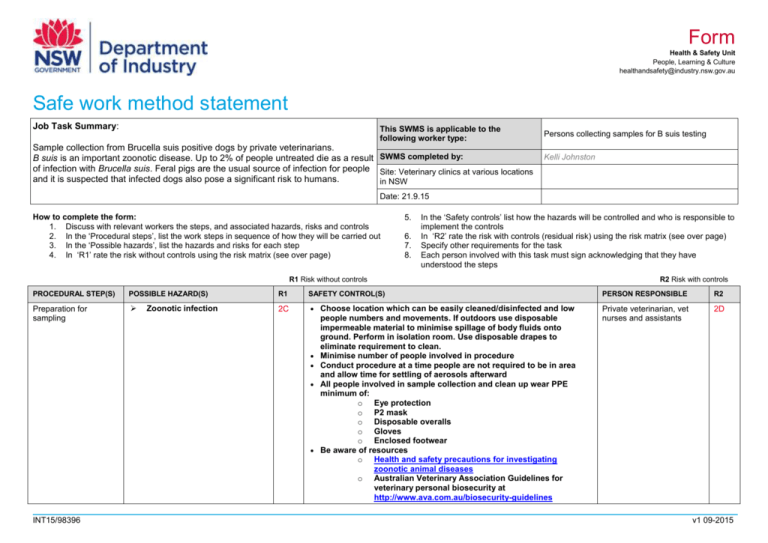
Form Health & Safety Unit People, Learning & Culture healthandsafety@industry.nsw.gov.au Safe work method statement Job Task Summary: This SWMS is applicable to the following worker type: Sample collection from Brucella suis positive dogs by private veterinarians. B suis is an important zoonotic disease. Up to 2% of people untreated die as a result SWMS completed by: of infection with Brucella suis. Feral pigs are the usual source of infection for people Site: Veterinary clinics at various locations and it is suspected that infected dogs also pose a significant risk to humans. in NSW Persons collecting samples for B suis testing Kelli Johnston Date: 21.9.15 How to complete the form: 1. Discuss with relevant workers the steps, and associated hazards, risks and controls 2. In the ‘Procedural steps’, list the work steps in sequence of how they will be carried out 3. In the ‘Possible hazards’, list the hazards and risks for each step 4. In ‘R1’ rate the risk without controls using the risk matrix (see over page) 5. 6. 7. 8. In the ‘Safety controls’ list how the hazards will be controlled and who is responsible to implement the controls In ‘R2’ rate the risk with controls (residual risk) using the risk matrix (see over page) Specify other requirements for the task Each person involved with this task must sign acknowledging that they have understood the steps R1 Risk without controls R2 Risk with controls PROCEDURAL STEP(S) POSSIBLE HAZARD(S) R1 SAFETY CONTROL(S) PERSON RESPONSIBLE R2 Preparation for sampling 2C Choose location which can be easily cleaned/disinfected and low Private veterinarian, vet nurses and assistants 2D Zoonotic infection INT15/98396 people numbers and movements. If outdoors use disposable impermeable material to minimise spillage of body fluids onto ground. Perform in isolation room. Use disposable drapes to eliminate requirement to clean. Minimise number of people involved in procedure Conduct procedure at a time people are not required to be in area and allow time for settling of aerosols afterward All people involved in sample collection and clean up wear PPE minimum of: o Eye protection o P2 mask o Disposable overalls o Gloves o Enclosed footwear Be aware of resources o Health and safety precautions for investigating zoonotic animal diseases o Australian Veterinary Association Guidelines for veterinary personal biosecurity at http://www.ava.com.au/biosecurity-guidelines v1 09-2015 PROCEDURAL STEP(S) POSSIBLE HAZARD(S) R1 SAFETY CONTROL(S) PERSON RESPONSIBLE R2 Private veterinarian, vet nurses and assistants 2D Private veterinarian, vet nurses and assistants 3D Private veterinarian, vet nurses and assistants 4D o Collecting samples Human Brucellosis from exposure to infectious agent in blood or bodily fluids contacting mucous membranes (mouth, nose, eyes) or contact with open wound 1C Pregnant women should avoid working with suspect or confirmed B Collecting samples Collecting samples INT15/56218 Working with animals – injury from bites, scratches 3B Handling heavy loads eg large dogs causing back, muscle or joint strain 3B suis dogs Cover cuts and abrasions with impermeable dressing or clothing Minimise creation of aerosols or splashes of bodily fluids by: o Castration – closed method o Hysterectomy – as for pyometra o Dystocia/retained fetal membranes – vaginal swab or membranes directly into container o Caesarean – swab or aspirate fluids, pup or membranes directly into container o Urine – cystocentesis preferred. If midstream wear PPE and plan how to deal with urine on floor/ground. Assume exterior of container is contaminated. Wash hands thoroughly with soapy water or antiseptic after removing PPE Do not eat, drink or smoke while conducting collection. On completion of collection, before removing PPE: o Clean and disinfect re-useable equipment by submerging in warm soapy water or disinfectant rather than using running water to ensure aerosols are not created o Chlorine, iodine based disinfectants and Virkon S are effective if used at recommended concentration for the recommended time on clean surfaces or equipment. Hot water (60oC for 10 minutes) is also effective. Dispose of contaminated waste eg contaminated PPE using clinical waste systems (do not re-sheath needles) Assess temperament before handling and use PPE and handling tools if needed eg. Muzzle or chemical restraint. Do not attempt sampling if animal cannot be safely handled Avoid lifting large dogs or use equipment or assistance Page 2 V3/05-2015 PROCEDURAL STEP(S) POSSIBLE HAZARD(S) R1 SAFETY CONTROL(S) PERSON RESPONSIBLE R2 Collecting samples Sharps injury or infection from cuts or puncture wounds 3B Ensure all equipment is sharp and in good repair Wear PPE (as above) Do not re-sheath needles, dispose directly into sharps container If sharps injury occurs, wash injury, apply antiseptic and seek medical advice immediately Private veterinarian, vet nurses and assistants 3D Collecting samples Using an awkward or sustained posture causing back, muscle or joint strain 3B Take regular breaks Share work load Position patient at desk height when possible Use well maintained equipment Private veterinarian, vet nurses and assistants 3D Sending and storing samples Exposure of other workers to infectious agent 2B Samples to be packed and consigned in accordance with the NSW Department of Primary Industries Laboratory Manual see http://www.dpi.nsw.gov.au/agriculture/vetmanual/submission Including specific instructions at NSW Department of Primary Industries CVO Bulletin to Veterinarians: Brucellosis (B. suis) in dogs http://www.dpi.nsw.gov.au/biosecurity/animal/humans/brucellos is-in-dogs Dispose of contaminated waste using clinical waste systems Private veterinarian, vet nurses, assistants and laboratory staff 2D Body/body parts to be placed into impervious bag and sealed. Double bag such that exterior surfaces are uncontaminated. Ensure body fluids do not spill from the bag while awaiting pick up eg in refrigerator If disposed on farm, burying is acceptable Private veterinarian, vet nurses, assistants and laboratory staff 2D Carcase disposal Exposure of others to infectious agent 2B WHS RISK MATRIX INT15/56218 HIERARCHY OF CONTROLS Page 3 V3/05-2015 OTHER JOB REQUIREMENTS List staff skills/competencies and licences required for safe job performance: List items of plant/equipment/tools required: Syringes, needles, specimen jars, swabs, body bags, antiseptic, disinfectant, cleaning equipment, contaminated waste facility, sharps container, Relevant codes of practice, legislation standards or critical risk controls that may be applicable: Maintenance checks, site/workplace inspections required: o o o o Health and safety precautions for investigating zoonotic animal diseases http://www.ava.com.au/biosecurity-guidelines http://www.dpi.nsw.gov.au/biosecurity/animal/humans/brucellosis-indogs Additional approvals, certificates, WorkCover approvals/permits required e.g. confined spaces, working at heights, hot works etc: PPE required: Gloves Overalls Safety footwear Eye protection P2 mask Has a risk assessment been completed for any work involving confined spaces, electrical work or diving work N/A APPROVAL (Officer, Manager, Supervisor i.e. person responsible for ensuring compliance with SWMS) Date: 19 October 2015 Name: Manager Animal biosecurity Services and Response I HAVE READ AND UNDERSTAND THIS SAFE WORK METHOD STATEMENT NAME INT15/56218 SIGNATURE DATE NAME Page 4 SIGNATURE DATE V3/05-2015
